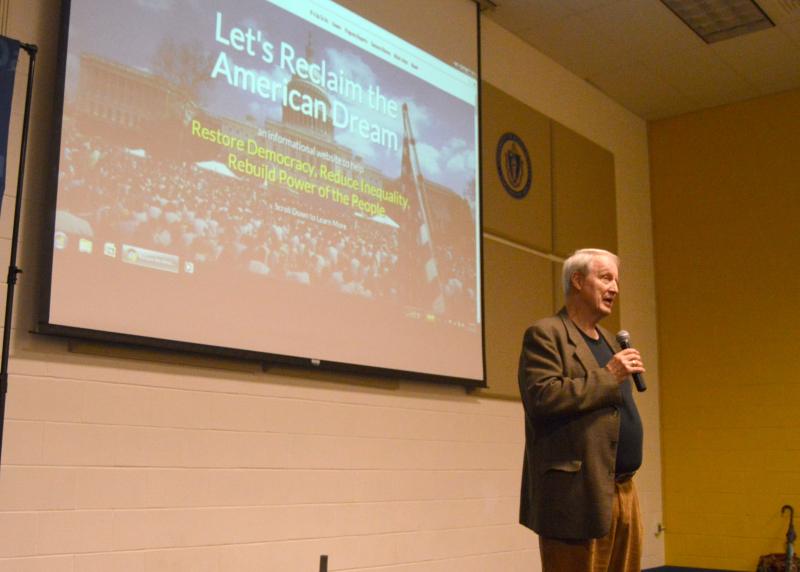Hendrick Smith discusses America's 'broken' political system
According to Hendrick Smith, America has a broken political system, and, if citizens hope to fix it, they will need to get engaged and stay engaged. Voting once a year, he said, is not enough.
Smith recently brought his book tour to UMass Dartmouth. He’s written several best-selling books in his career, the latest being “Who Stole the American Dream?” which looks at the ways the American Dream has disintegrated over the past four decades.
Smith began his career in the 1950s in print journalism, working as a reporter and editor at The New York Times. He was part of the team that won a Pulitzer Prize for the Pentagon Papers series in 1971, and he’s been awarded a Pulitzer for his international reporting in Russia and Eastern Europe in the ‘70s.
In his talk, Smith frequently used a car analogy to describe the state of the nation.
“We have a car that doesn’t run, and we’re not looking under the hood. We’re saying, ‘Let’s change the driver, and it should work.’ No, folks. It’s broken,” said Smith.
By simply voting for new elected officials – or, in this case, changing the driver – we’re not looking at the root cause of America’s ills: a broken political system.
He cited gridlock in Washington as a source of the problem as well as money flooding into politics.
“The CEOs of the ‘50s, ‘60s and ‘70s believed it was good business and smart economics to pay their workforce good wages and good benefits. It generated unprecedented growth and a sense of economic security, which we don’t have today,” he said.
“If you have companies giving 91 percent of their profits to their shareholders and only nine percent invested in growth, then there’s something about the laws around that that makes it advantageous for those corporations,” he said.
He said in today’s economy, people are struggling to afford housing, healthcare and education because wages have not caught up with inflation.
He posits that the first step Americans can take to change the political landscape is to address gerrymandering. Gerrymandering is a process in which the lines of political districts are redrawn, often to the benefit of one political party.
“Gerrymandering is now done with extremely sophisticated computer software. [Politicians] can carve the districts to suit themselves,” said Smith. “In 2012, Democratic candidates for the House of Representatives nationwide got a million more votes than Republicans did. But Republicans came out with a 33 seat majority. Most, if not all of that, was through gerrymandering.”
Because the process takes competition out of elections, it threatens democracy, he said.
The crowd that attended Smith’s speech was composed mostly of adults from the area, a point he noted in his talk, saying he was “disappointed” by the lack of students in attendance. However, he said that he harbors high hopes for the millennial generation.
“I think it’s important to connect with students. It’s not easy for us that are older. We tend to be skeptical. We see all the selfies and think that’s all they are. It’s not true,” said Smith.
“My experience has been encouraging,” he continued. “But [young people] are not joiners. They don’t get into movements. But if you look at what they’ve done with LGBT rights. The change that’s taken place in the attitude of the country – young people are way in the vanguard of that change.”
He said he’s visited over 50 campuses on his book tour, and the number one question he receives from audiences is if Bernie Sanders can take the White House.
“We have something crazy in our minds: winning [the election] has to be winning the office. If Bernie Sanders loses the nomination, but moves the national debate – he’s won,” he said.
“It’s the wrong question because it’s the question the media wants you to ask,” said Smith. “And all the other candidates want you to ask it because they want to shut that lion up. The easiest way is to say ‘that’s not a winnable lion.’”
But that brought him right back to the broken car analogy. You can’t just change the driver, he reiterated.














